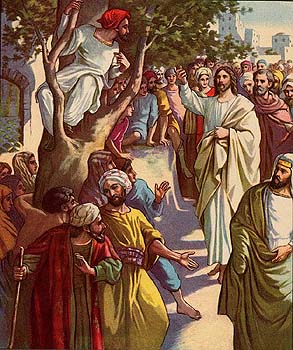Lk. 19:1-10
If only to stress the message of how a truly repentant sinner should reparate, this story of Zacchaeus gives us a very good picture. Zacchaeus, a tax collector, was considered an enemy by his fellow Jews because of the excessive taxes he collected from them. The Roman officials were just concerned about their take. Jews who were assigned to collect for them were free to add whatever amount they wanted. This was the source of anger from their fellow Jews. For this reason, a tax collector like Zacchaeus during the time of Jesus was also considered a great sinner. That is why the Pharisees and the Scribes were scandalized when Jesus partied at the house of Matthew. But that is another story. 

Going back to Zacchaeus, he must have heard about Jesus particularly His coming to town. He knew how popular Jesus was. He heard His penetrating Words and His wonderful miracles. Zacchaeus was attracted to Jesus. He wanted to see Jesus! So, he went to find a way to see Him. It was mentioned in the Gospel that he was small of stature. Together with so many people who wanted to have a glimpse of Jesus, it would be impossible for him to meet Jesus. So, even though it was embarrassing, he climbed a sycamore tree. He and Jesus meant to see each other. Jesus must have felt the want of Zacchaeus. So, when Jesus saw Zaccaheus, He approached him and told Zaccaheus the good news of visiting his house. That clinched it for Zacchaeus. The gesture of Jesus was enough for Zacchaeus to realize His care and his need for repentance. Then, everybody heard the pronouncements of a reformed man, "Behold, half of my possessions, Lord, I shall give to the poor, and if I have extorted anything from anyone, I shall repay it four times over." How we wish all repentant sinners will also do a la Zacchaeus! We should not only say sorry, but reparate if we have done any damage and repay if we have stolen something. There lies the true sign of a repentant sinner! Because of this Zacchaeus act, Jesus said, "Today salvation has come to this house because this man too is a descendant of Abraham." Zacchaeus regained his dignity not only as a Jew but also as a child of God.
Unknowingly maybe, the structure of the Sacrament of Reconciliation is present in the story. The elements maybe found in the story. The elements of the Sacrament of Reconciliation are; Examination of Conscience, Confession of Sins, Penance, and Absolution. The Examination of Conscience is found in the condition of Zacchaeus before and when he met Jesus. Confession was when he mentioned what he had done to others in terms of fraud and extortion. Penance happened when he promised to repay what he had taken and offered to give to the poor. Absolution happened when Jesus declared that salvation has come to his house.
The Sacrament of Reconciliation is an effective Sacrament. Zacchaeus helped us understand its true essence. The reparation part had been taken for granted so many times if not totally neglected. Justice requires that we at least do something to repay and reparate. It is the true and effective sign of repentance. Anything short of it makes our repentance questionable. God forgives unconditionally but He expects full contrition if we are to benefit His full forgiveness.
Let us pray for more Zacchaeuses.












